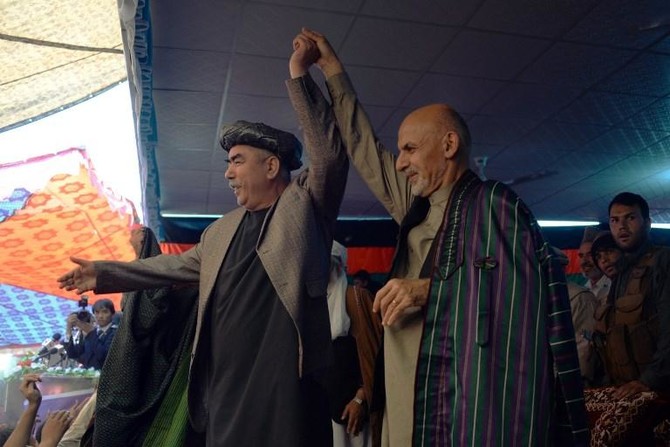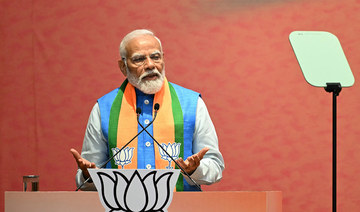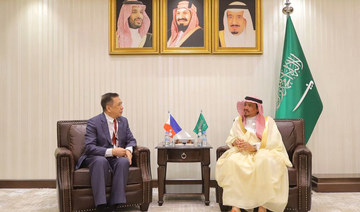KABUL: Demonstrators who had blocked border crossings and various state facilities as part of nearly three weeks-long anti-government move in northern Afghanistan, ended their protests on Monday after exiled first Vice President Abdul Rashid Dostum made an appeal on his arrival, residents and officials said.
“After what you can call appeal or order of Dostum, we have ended the protests, life is returning to normalcy,” Ahmad Tawab, a protester from the north told Arab News by phone.
Dostum, who was exiled by President Ashraf Ghani’s government over allegations of sexual abuse, returned home on Sunday to a rapturous reception from supporters as well as officials and is set to resume his duties as normal.
Dostum was greeted by hundreds of people, including women, some senior government officials, among them his political allies on a red carpet which was put on the tarmac of Kabul airport next to the stairs of the chartered plane that brought him from Turkey.
Some kissed his hands, others tried to get near him amid tight security with several TV stations showing live his arrival.
But as his convoy of armoured motorcades left the airport, a suicide bomber blew himself up moments later.
Kabul police chief Daud Amin said that has been 19 killed, mostly security forces, and 60 were wounded.
Speaking to a big crowd in the garden of his spacious office, Dostum said presidential elite force were among the casualties.
Wearing a khaki suit with a necktie, the bespectacled burly former militia leader termed the arrest of his senior commander in the north by government Nizamuddin Qaisari as an “unfair move”. He said will talk with Ghani tomorrow and will raise the issue of the arrest.
Dostum who until recently, spoken against peace talks with Taliban, told the crowd that he was in favor of negotiations with the militants.
“I as the first Vice President, consider peace with the Taliban more important than any other thing,” he said. He called on his fellow ethnic Uzbek supporters to end the protest in north, allow reopening of schools, state institutions and border crossings which they had closed since the start of the protests nearly three weeks ago.
Dostum’s return follows nearly three weeks of mass protests in northern Afghanistan by his ethnic Uzbek supporters, who blocked several border crossings and government institutions, and threatened to boycott the long-delayed October elections.
The protests were a major headache for the government amid increased attacks by the Taliban and Daesh in the north recently.
Dostum’s supporters accuse Ghani of having sidelined him. The protests were triggered by the arrest of Qaisari, accused of severe human rights abuses and threatening to kill provincial officials.
In a video, government troops were seen beating Qaisari’s handcuffed guards during his arrest, stoking further anger. Haroon Chakansuri, a spokesman for Ghani, said Dostum had gone to Turkey for nearly 14 months for unspecified medical treatment.
Accusations that Dostum had ordered his guards to sexually abuse and torture political rival Ahmad Eschi will be handled independently by the courts, Chakansuri said. Dostum supporters say the allegations about Eschi are a conspiracy. Ghani picked Dostum, the self-proclaimed leader of ethnic Uzbeks, as his running mate in the 2014 elections.
Ghani last year blocked Dostum’s return from exile when he tried to fly home to form an opposition alliance including senior government members. The ethnic Uzbek vote is essential for any candidate in the presidential elections slated for next year. Ghani has said he will stand for office again.
“I think the government wants to hunt two pigeons with a shot,” said Inayatullah Kakar, an Afghan researcher.“It (Dostum’s return) will make the north tensions calm … then he will be part of the upcoming elections ...”

























